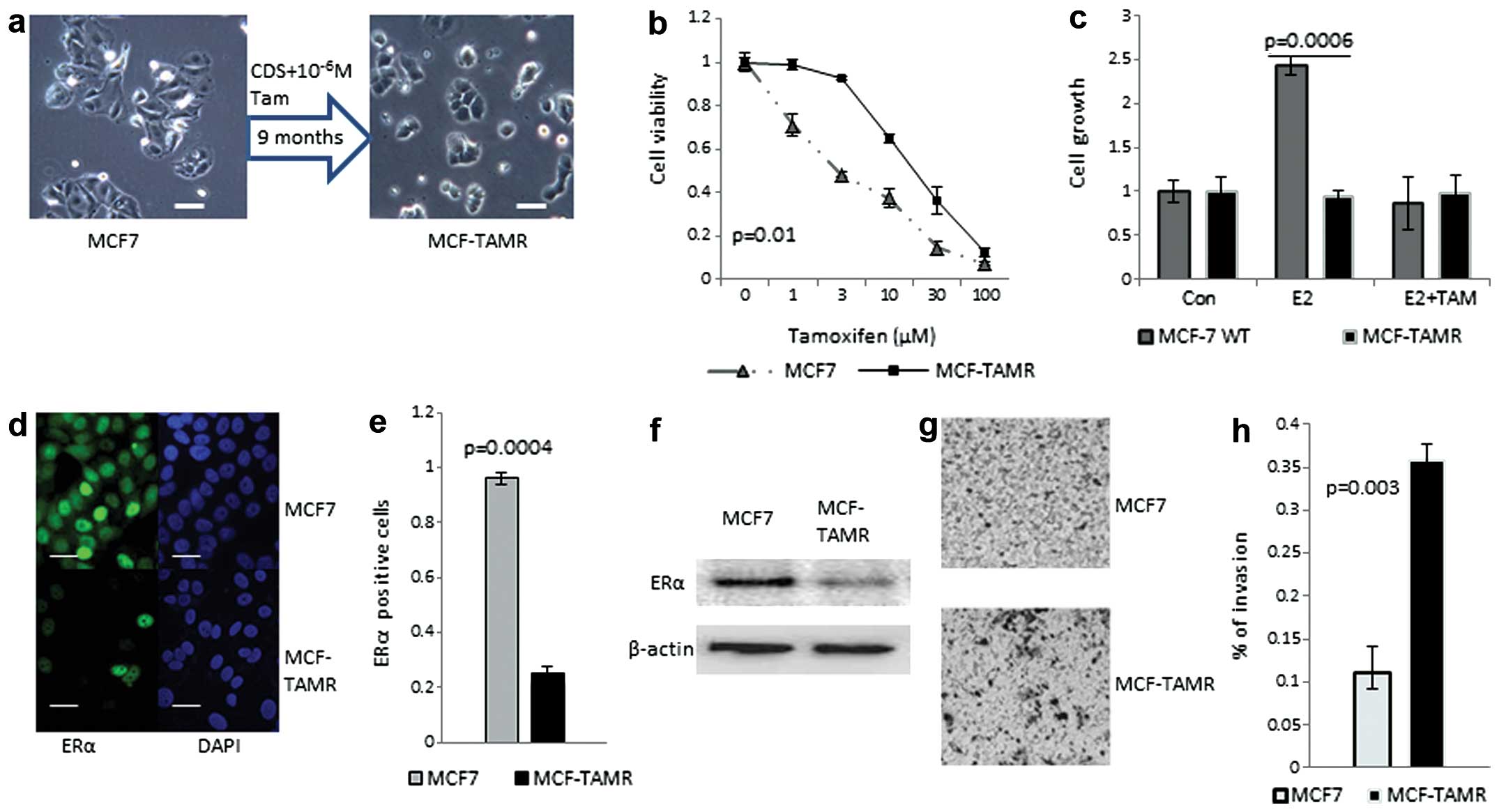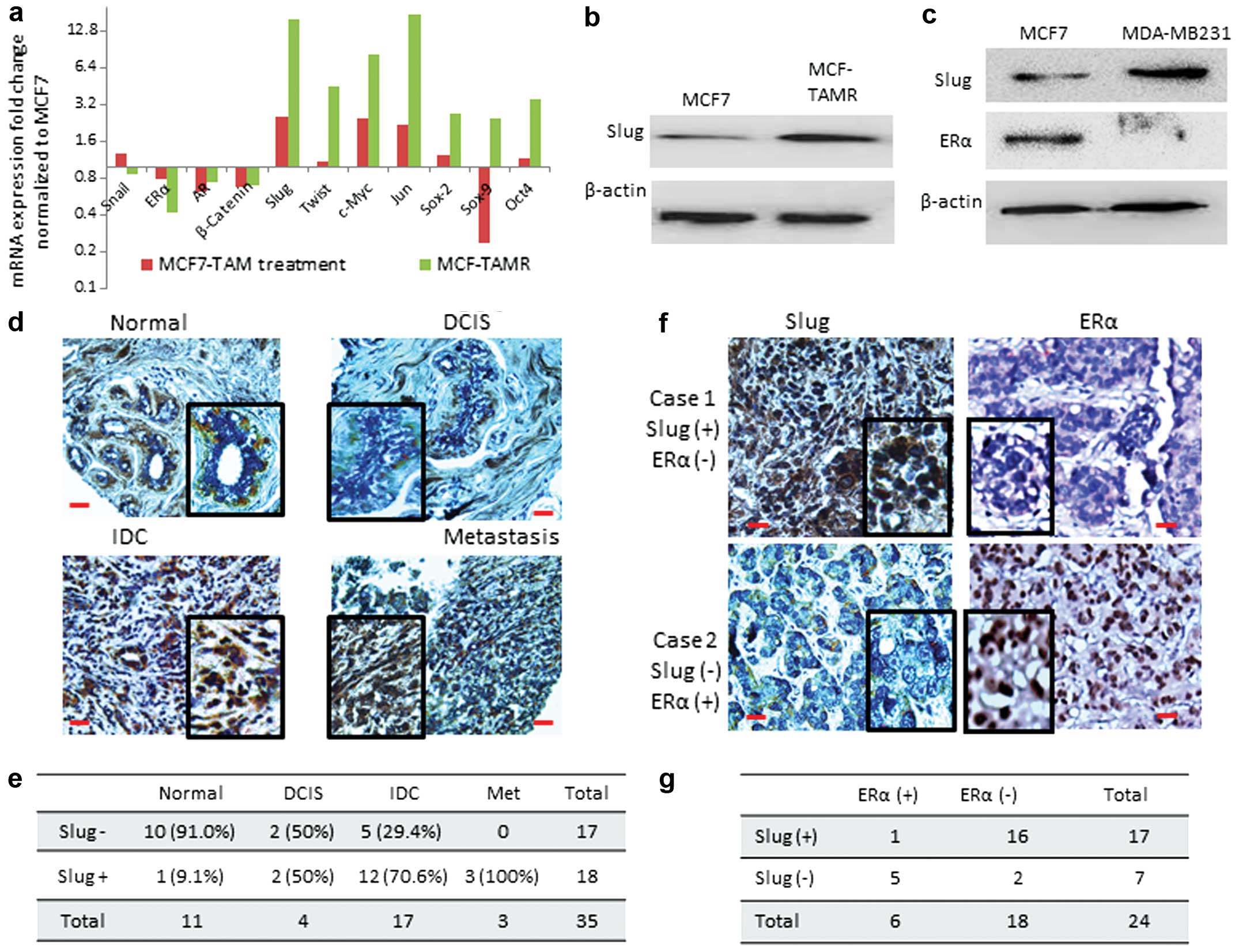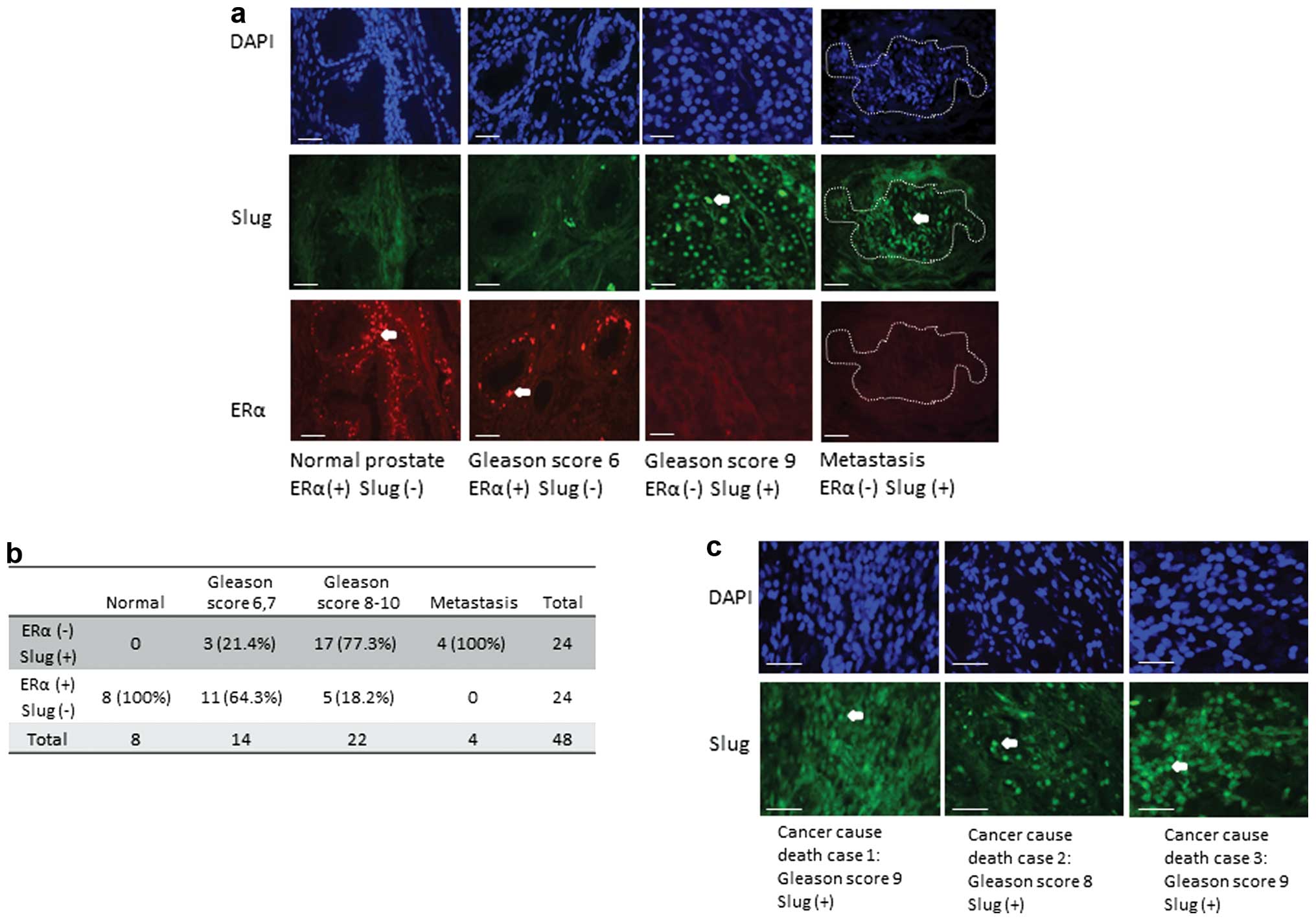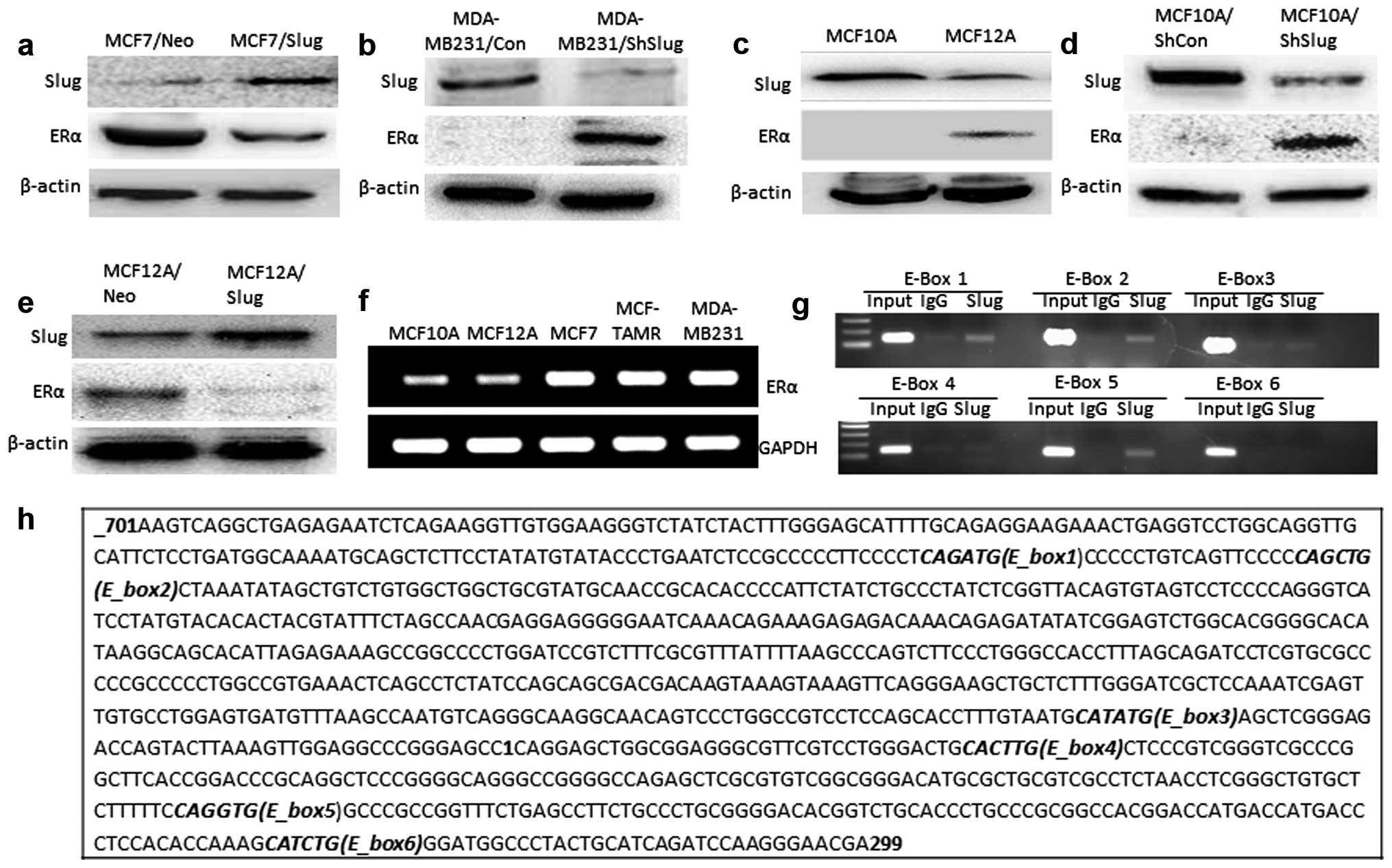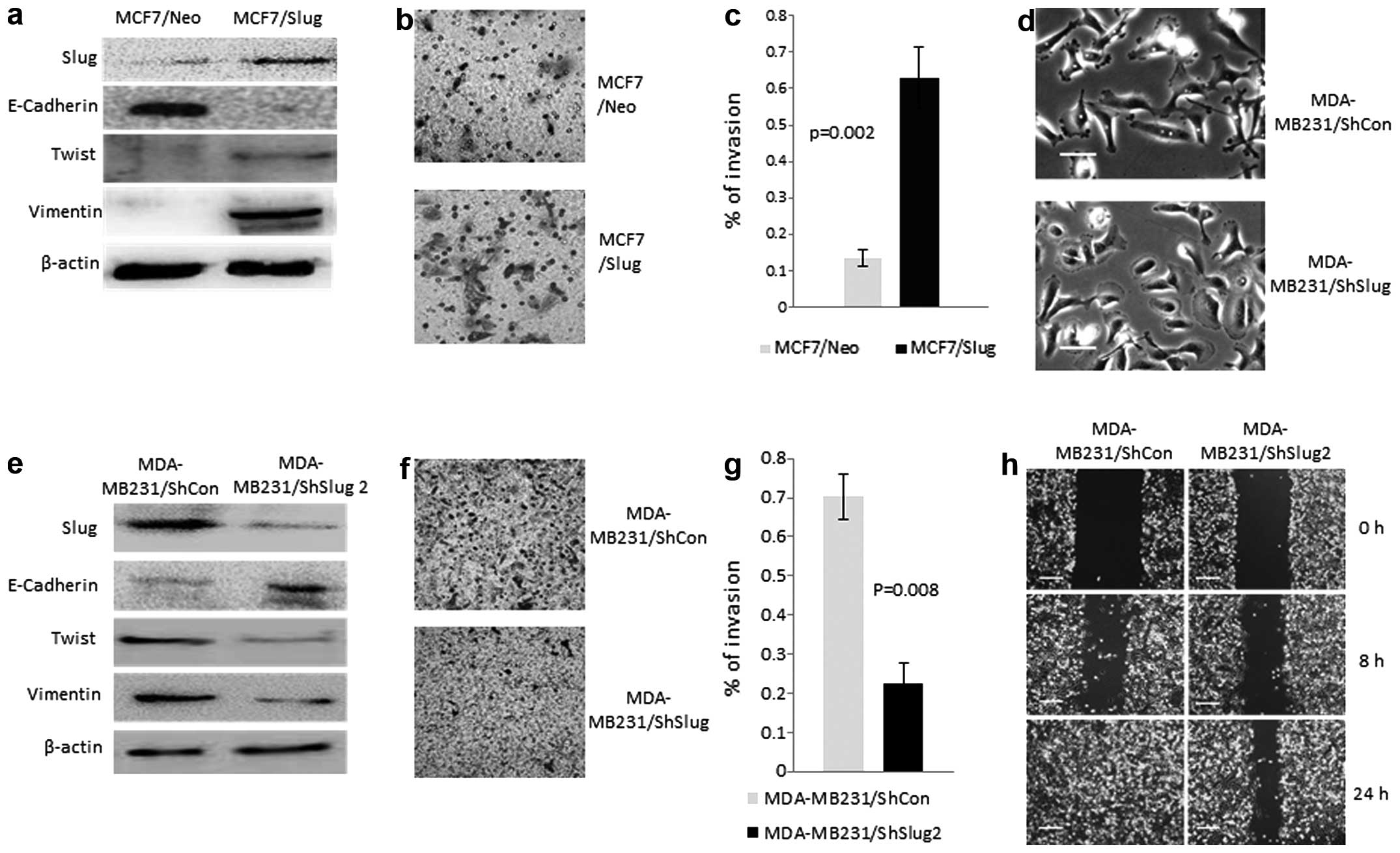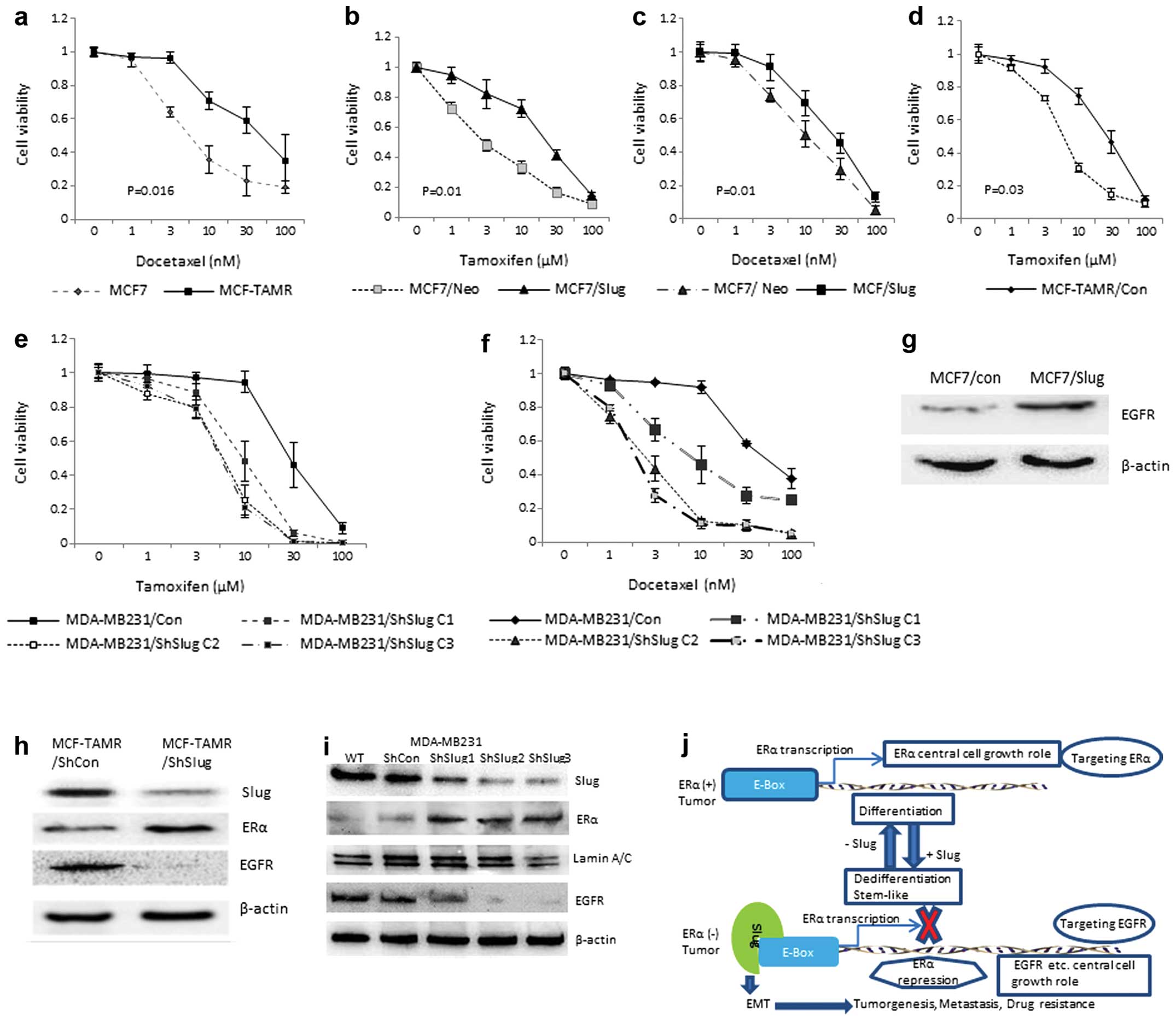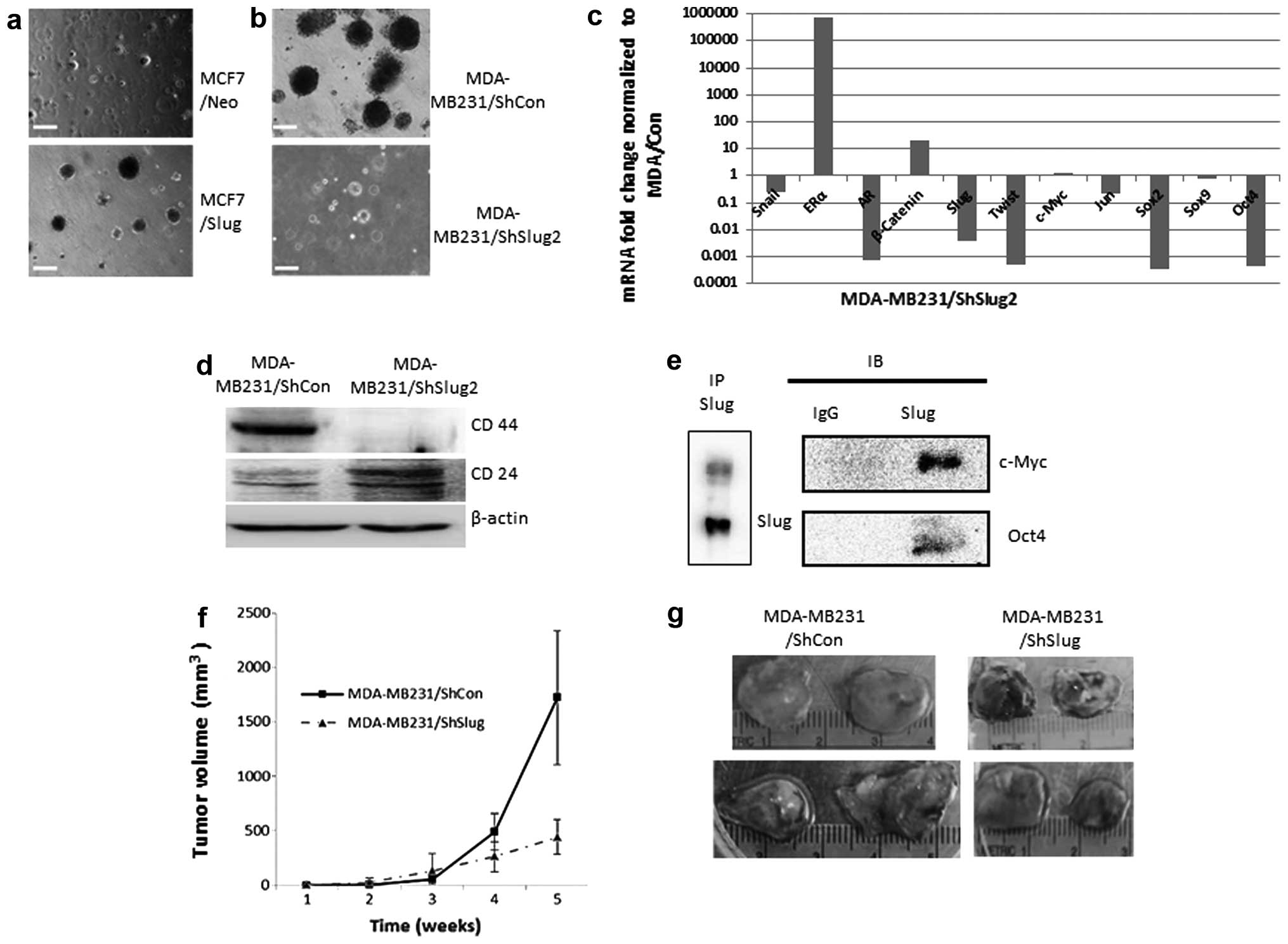|
1
|
Fletcher JI, Haber M, Henderson MJ and
Norris MD: ABC transporters in cancer: more than just drug efflux
pumps. Nat Rev Cancer. 10:147–156. 2010. View Article : Google Scholar : PubMed/NCBI
|
|
2
|
Rhim AD, Mirek ET, Aiello NM, Maitra A,
Bailey JM, McAllister F, Reichert M, Beatty GL, Rustgi AK,
Vonderheide RH, et al: EMT and dissemination precede pancreatic
tumor formation. Cell. 148:349–361. 2012. View Article : Google Scholar : PubMed/NCBI
|
|
3
|
Musgrove EA and Sutherland RL: Biological
determinants of endocrine resistance in breast cancer. Nat Rev
Cancer. 9:631–643. 2009. View
Article : Google Scholar : PubMed/NCBI
|
|
4
|
Nieto MA: Epithelial-mesenchymal
transitions in development and disease: old views and new
perspectives. Int J Dev Biol. 53:1541–1547. 2009. View Article : Google Scholar : PubMed/NCBI
|
|
5
|
Thiery JP, Acloque H, Huang RY and Nieto
MA: Epithelial-mesenchymal transitions in development and disease.
Cell. 139:871–890. 2009. View Article : Google Scholar : PubMed/NCBI
|
|
6
|
Guo W, Keckesova Z, Donaher JL, Shibue T,
Tischler V, Reinhardt F, Itzkovitz S, Noske A, Zurrer-Hardi U, Bell
G, et al: Slug and Sox9 cooperatively determine the mammary stem
cell state. Cell. 148:1015–1028. 2012. View Article : Google Scholar : PubMed/NCBI
|
|
7
|
Maseki S, Ijichi K, Tanaka H, Fujii M,
Hasegawa Y, Ogawa T, Murakami S, Kondo E and Nakanishi H:
Acquisition of EMT phenotype in the gefitinib-resistant cells of a
head and neck squamous cell carcinoma cell line through
Akt/GSK-3beta/snail signalling pathway. Br J Cancer. 106:1196–1204.
2012. View Article : Google Scholar : PubMed/NCBI
|
|
8
|
Nurwidya F, Takahashi F, Murakami A and
Takahashi K: Epithelial mesenchymal transition in drug resistance
and metastasis of lung cancer. Cancer Res Treat. 44:151–156. 2012.
View Article : Google Scholar : PubMed/NCBI
|
|
9
|
Tretiakova MS, Hart J, Shabani-Rad MT,
Zhang J and Gao ZH: Distinction of hepatocellular adenoma from
hepatocellular carcinoma with and without cirrhosis using
E-cadherin and matrix metalloproteinase immunohistochemistry. Mod
Pathol. 22:1113–1120. 2009. View Article : Google Scholar : PubMed/NCBI
|
|
10
|
Al-Hajj M, Wicha MS, Benito-Hernandez A,
Morrison SJ and Clarke MF: Prospective identification of
tumorigenic breast cancer cells. Proc Natl Acad Sci USA.
100:3983–3988. 2003. View Article : Google Scholar : PubMed/NCBI
|
|
11
|
Collins AT, Berry PA, Hyde C, Stower MJ
and Maitland NJ: Prospective identification of tumorigenic prostate
cancer stem cells. Cancer Res. 65:10946–10951. 2005. View Article : Google Scholar : PubMed/NCBI
|
|
12
|
Haraguchi N, Ishii H, Mimori K, Tanaka F,
Ohkuma M, Kim HM, Akita H, Takiuchi D, Hatano H, Nagano H, et al:
CD13 is a therapeutic target in human liver cancer stem cells. J
Clin Invest. 120:3326–3339. 2010. View
Article : Google Scholar : PubMed/NCBI
|
|
13
|
Ricci-Vitiani L, Lombardi DG, Pilozzi E,
Biffoni M, Todaro M, Peschle C and De Maria R: Identification and
expansion of human colon-cancer-initiating cells. Nature.
445:111–115. 2007. View Article : Google Scholar
|
|
14
|
Zeppernick F, Ahmadi R, Campos B, Dictus
C, Helmke BM, Becker N, Lichter P, Unterberg A, Radlwimmer B and
Herold-Mende CC: Stem cell marker CD133 affects clinical outcome in
glioma patients. Clin Cancer Res. 14:123–129. 2008. View Article : Google Scholar : PubMed/NCBI
|
|
15
|
Li Y, Zeng Y, Mooney SM, Yin B, Mizokami
A, Namiki M and Getzenberg RH: Resistance to paclitaxel increases
the sensitivity to other microenvironmental stresses in prostate
cancer cells. J Cell Biochem. 112:2125–2137. 2011. View Article : Google Scholar : PubMed/NCBI
|
|
16
|
Sharma SV, Lee DY, Li B, Quinlan MP,
Takahashi F, Maheswaran S, McDermott U, Azizian N, Zou L, Fischbach
MA, et al: A chromatin-mediated reversible drug-tolerant state in
cancer cell subpopulations. Cell. 141:69–80. 2010. View Article : Google Scholar : PubMed/NCBI
|
|
17
|
Camp ER, Findlay VJ, Vaena SG, Walsh J,
Lewin DN, Turner DP and Watson DK: Slug expression enhances tumor
formation in a noninvasive rectal cancer model. J Surg Res.
170:56–63. 2011. View Article : Google Scholar : PubMed/NCBI
|
|
18
|
Haslehurst AM, Koti M, Dharsee M, Nuin P,
Evans K, Geraci J, Childs T, Chen J, Li J, Weberpals J, et al: EMT
transcription factors snail and slug directly contribute to
cisplatin resistance in ovarian cancer. BMC Cancer. 12:912012.
View Article : Google Scholar : PubMed/NCBI
|
|
19
|
Proia TA, Keller PJ, Gupta PB, Klebba I,
Jones AD, Sedic M, Gilmore H, Tung N, Naber SP, Schnitt S, et al:
Genetic predisposition directs breast cancer phenotype by dictating
progenitor cell fate. Cell Stem Cell. 8:149–163. 2011. View Article : Google Scholar : PubMed/NCBI
|
|
20
|
Takeda M, Mizokami A, Mamiya K, Li YQ,
Zhang J, Keller ET and Namiki M: The establishment of two
paclitaxel-resistant prostate cancer cell lines and the mechanisms
of paclitaxel resistance with two cell lines. Prostate. 67:955–967.
2007. View Article : Google Scholar : PubMed/NCBI
|
|
21
|
Wu Y, Elshimali Y, Sarkissyan M, Mohamed
H, Clayton S and Vadgama JV: Expression of FOXO1 is associated with
GATA3 and Annexin-1 and predicts disease-free survival in breast
cancer. Am J Cancer Res. 2:104–115. 2012.
|
|
22
|
Siegel R, Naishadham D and Jemal A: Cancer
statistics, 2012. CA Cancer J Clin. 62:10–29. 2012. View Article : Google Scholar : PubMed/NCBI
|
|
23
|
Green KA and Carroll JS:
Oestrogen-receptor-mediated transcription and the influence of
co-factors and chromatin state. Nat Rev Cancer. 7:713–722. 2007.
View Article : Google Scholar : PubMed/NCBI
|
|
24
|
Pardal R, Clarke MF and Morrison SJ:
Applying the principles of stem-cell biology to cancer. Nat Rev
Cancer. 3:895–902. 2003. View Article : Google Scholar
|
|
25
|
Shi J, Severson C, Yang J, Wedlich D and
Klymkowsky MW: Snail2 controls mesodermal BMP/Wnt induction of
neural crest. Development. 138:3135–3145. 2011. View Article : Google Scholar : PubMed/NCBI
|
|
26
|
Lin ZS, Chu HC, Yen YC, Lewis BC and Chen
YW: Kruppel-like factor 4, a tumor suppressor in hepatocellular
carcinoma cells reverts epithelial mesenchymal transition by
suppressing slug expression. PLoS One. 7:e435932012. View Article : Google Scholar
|
|
27
|
Shioiri M, Shida T, Koda K, Oda K, Seike
K, Nishimura M, Takano S and Miyazaki M: Slug expression is an
independent prognostic parameter for poor survival in colorectal
carcinoma patients. Br J Cancer. 94:1816–1822. 2006. View Article : Google Scholar : PubMed/NCBI
|
|
28
|
Risbridger GP, Davis ID, Birrell SN and
Tilley WD: Breast and prostate cancer: more similar than different.
Nat Rev Cancer. 10:205–212. 2010. View Article : Google Scholar : PubMed/NCBI
|
|
29
|
Brabletz T: To differentiate or not -
routes towards metastasis. Nat Rev Cancer. 12:425–436. 2012.
View Article : Google Scholar : PubMed/NCBI
|
|
30
|
Friedl P and Wolf K: Tumour-cell invasion
and migration: diversity and escape mechanisms. Nat Rev Cancer.
3:362–374. 2003. View Article : Google Scholar : PubMed/NCBI
|
|
31
|
Thiery JP: Epithelial-mesenchymal
transitions in tumour progression. Nat Rev Cancer. 2:442–454. 2002.
View Article : Google Scholar : PubMed/NCBI
|
|
32
|
Sims AH, Howell A, Howell SJ and Clarke
RB: Origins of breast cancer subtypes and therapeutic implications.
Nat Clin Pract Oncol. 4:516–525. 2007. View Article : Google Scholar : PubMed/NCBI
|
|
33
|
Park S, Mazina O, Kitagawa A, Wong P and
Matsumura F: TCDD causes suppression of growth and differentiation
of MCF10A, human mammary epithelial cells by interfering with their
insulin receptor signaling through c-Src kinase and ERK activation.
J Biochem Mol Toxicol. 18:322–331. 2004. View Article : Google Scholar
|
|
34
|
Dawson PJ, Wolman SR, Tait L, Heppner GH
and Miller FR: MCF10AT: a model for the evolution of cancer from
proliferative breast disease. Am J Pathol. 148:313–319.
1996.PubMed/NCBI
|
|
35
|
Paine TM, Soule HD, Pauley RJ and Dawson
PJ: Characterization of epithelial phenotypes in mortal and
immortal human breast cells. Int J Cancer. 50:463–473. 1992.
View Article : Google Scholar : PubMed/NCBI
|
|
36
|
Thomas C and Gustafsson JA: The different
roles of ER subtype in cancer biology and therapy. Nat Rev Cancer.
11:597–608. 2011. View Article : Google Scholar : PubMed/NCBI
|
|
37
|
Turner FE, Broad S, Khanim FL, Jeanes A,
Talma S, Hughes S, Tselepis C and Hotchin NA: Slug regulates
integrin expression and cell proliferation in human epidermal
keratinocytes. J Biol Chem. 281:21321–21331. 2006. View Article : Google Scholar : PubMed/NCBI
|
|
38
|
Martinez-Estrada OM, Culleres A, Soriano
FX, Peinado H, Bolos V, Martinez FO, Reina M, Cano A, Fabre M and
Vilaro S: The transcription factors Slug and Snail act as
repressors of Claudin-1 expression in epithelial cells. Biochem J.
394:449–457. 2006. View Article : Google Scholar :
|
|
39
|
Shih JY, Tsai MF, Chang TH, Chang YL, Yuan
A, Yu CJ, Lin SB, Liou GY, Lee ML, Chen JJ, et al: Transcription
repressor slug promotes carcinoma invasion and predicts outcome of
patients with lung adenocarcinoma. Clin Cancer Res. 11:8070–8078.
2005. View Article : Google Scholar : PubMed/NCBI
|
|
40
|
Friedl P and Alexander S: Cancer invasion
and the microenvironment: plasticity and reciprocity. Cell.
147:992–1009. 2011. View Article : Google Scholar : PubMed/NCBI
|
|
41
|
Scheel C, Eaton EN, Li SH, Chaffer CL,
Reinhardt F, Kah KJ, Bell G, Guo W, Rubin J, Richardson AL, et al:
Paracrine and autocrine signals induce and maintain mesenchymal and
stem cell states in the breast. Cell. 145:926–940. 2011. View Article : Google Scholar : PubMed/NCBI
|
|
42
|
Gusterson B: Do ‘basal-like’ breast
cancers really exist? Nat Rev Cancer. 9:128–134. 2009. View Article : Google Scholar : PubMed/NCBI
|
|
43
|
Godar S, Ince TA, Bell GW, Feldser D,
Donaher JL, Bergh J, Liu A, Miu K, Watnick RS, Reinhardt F, et al:
Growth-inhibitory and tumor-suppressive functions of p53 depend on
its repression of CD44 expression. Cell. 134:62–73. 2008.
View Article : Google Scholar : PubMed/NCBI
|
|
44
|
Bhat-Nakshatri P, Appaiah H, Ballas C,
Pick-Franke P, Goulet R Jr, Badve S, Srour EF and Nakshatri H:
SLUG/SNAI2 and tumor necrosis factor generate breast cells with
CD44+/CD24− phenotype. BMC Cancer.
10:4112010. View Article : Google Scholar
|
|
45
|
Wu Y, Ginther C, Kim J, Mosher N, Chung S,
Slamon D and Vadgama JV: Expression of Wnt3 activates
Wnt/beta-catenin pathway and promotes EMT-like phenotype in
trastuzumab-resistant HER2-overexpressing breast cancer cells. Mol
Cancer Res. 10:1597–1606. 2012. View Article : Google Scholar : PubMed/NCBI
|
|
46
|
Jordan VC: Tamoxifen: a most unlikely
pioneering medicine. Nat Rev Drug Discov. 2:205–213. 2003.
View Article : Google Scholar : PubMed/NCBI
|
|
47
|
Lee MJ, Ye AS, Gardino AK, Heijink AM,
Sorger PK, MacBeath G and Yaffe MB: Sequential application of
anticancer drugs enhances cell death by rewiring apoptotic
signaling networks. Cell. 149:780–794. 2012. View Article : Google Scholar : PubMed/NCBI
|
|
48
|
Leav I, Lau KM, Adams JY, McNeal JE,
Taplin ME, Wang J, Singh H and Ho SM: Comparative studies of the
estrogen receptors beta and alpha and the androgen receptor in
normal human prostate glands, dysplasia, and in primary and
metastatic carcinoma. Am J Pathol. 159:79–92. 2001. View Article : Google Scholar : PubMed/NCBI
|
|
49
|
Perez-Mancera PA, Gonzalez-Herrero I,
Maclean K, Turner AM, Yip MY, Sanchez-Martin M, Garcia JL, Robledo
C, Flores T, Gutierrez-Adan A, et al: SLUG (SNAI2) overexpression
in embryonic development. Cytogenet Genome Res. 114:24–29. 2006.
View Article : Google Scholar : PubMed/NCBI
|
|
50
|
Savagner P, Yamada KM and Thiery JP: The
zinc-finger protein slug causes desmosome dissociation, an initial
and necessary step for growth factor-induced epithelial-mesenchymal
transition. J Cell Biol. 137:1403–1419. 1997. View Article : Google Scholar : PubMed/NCBI
|
|
51
|
Shirley SH, Greene VR, Duncan LM, Torres
Cabala CA, Grimm EA and Kusewitt DF: Slug expression during
melanoma progression. Am J Pathol. 180:2479–2489. 2012. View Article : Google Scholar : PubMed/NCBI
|















